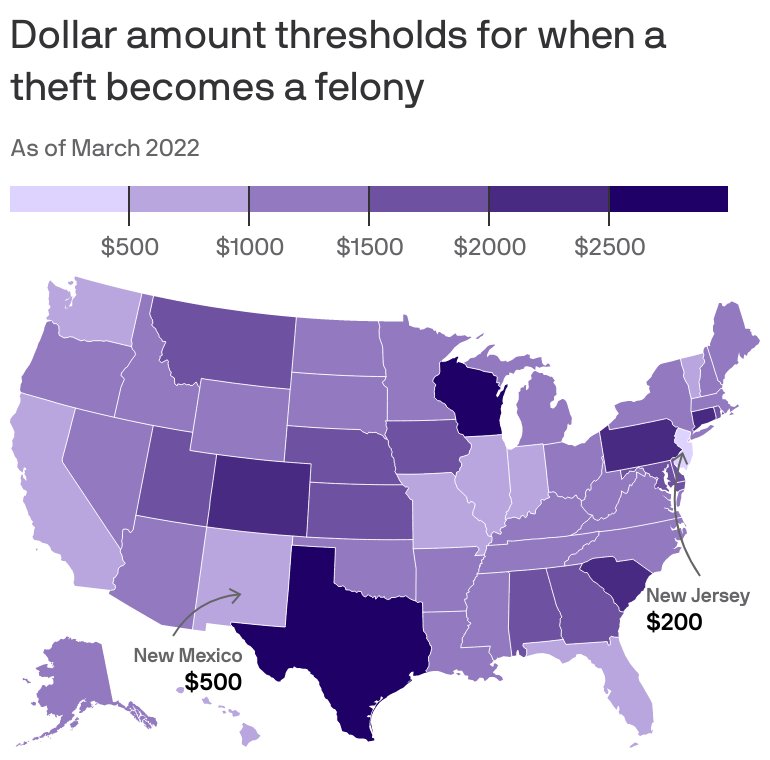Discover How Much Is Felony Theft: A Comprehensive Guide

Felony theft, in the United States, typically involves the theft of property valued above a certain threshold determined by each state. The exact monetary amount that constitutes felony theft varies across states but generally ranges from $500 to $1,000. This distinction is crucial as it determines the severity of the legal consequences one might face for committing theft. Understanding how much is felony theft in your state is essential to avoid serious legal repercussions. Let’s delve deeper into the specifics of felony theft thresholds to navigate this complex legal terrain effectively.
How Much is Felony Theft: Understanding the Legal Consequences
Welcome to our blog post that delves into the world of felony theft and its implications. Felony theft is a serious offense that carries significant legal consequences. In this comprehensive guide, we will explore the various aspects related to felony theft, including what constitutes felony theft, the potential penalties involved, and how it varies from misdemeanor theft. Let’s dive in!
What is Felony Theft?
Felony theft, also known as grand theft, is a criminal act where an individual unlawfully takes property or money that belongs to someone else with the intention of permanently depriving the rightful owner of it. The value of the stolen property typically determines whether the theft is considered a felony or a misdemeanor.
Factors Considered in Felony Theft
When determining if a theft offense qualifies as a felony, several factors are taken into account. These factors may include the value of the stolen property, any prior criminal history of the offender, and the circumstances surrounding the theft. In many jurisdictions, the threshold for felony theft is set at a certain dollar amount, such as $500 or $1,000.
Potential Penalties for Felony Theft
The penalties for felony theft can vary depending on the jurisdiction and the specific circumstances of the crime. In general, felony theft is associated with more severe consequences compared to misdemeanor theft. Penalties for felony theft may include imprisonment, fines, restitution to the victim, probation, and a criminal record.
Imprisonment
Individuals convicted of felony theft may face imprisonment in a state correctional facility for a specified period. The length of the sentence can vary based on factors such as the value of the stolen property and the defendant’s criminal history.
Fines and Restitution
In addition to imprisonment, individuals convicted of felony theft may be required to pay fines to the court and provide restitution to the victim. The amount of fines and restitution can depend on the value of the stolen property and the damages incurred by the victim.
Probation and Criminal Record
Some individuals convicted of felony theft may receive probation as part of their sentence. During probation, the individual is required to comply with certain conditions set by the court. Additionally, a conviction for felony theft can result in a permanent criminal record, which can have long-lasting consequences on one’s personal and professional life.
Differences Between Felony Theft and Misdemeanor Theft
It’s essential to understand the distinction between felony theft and misdemeanor theft. Misdemeanor theft typically involves lower-value stolen items and carries less severe penalties compared to felony theft. In many cases, multiple offenses of misdemeanor theft can escalate to a felony charge. Understanding these differences can help individuals make informed decisions and avoid engaging in criminal activities.
Effect of Prior Criminal History
Individuals with a history of theft-related offenses are more likely to face felony charges for subsequent theft crimes. Repeat offenders may receive harsher penalties, including longer prison sentences and higher fines.
Value of Stolen Property
The value of the stolen property is a crucial factor in determining whether theft is classified as a felony or a misdemeanor. Generally, theft involving high-value items is more likely to be prosecuted as a felony, while theft of lower-value goods may result in a misdemeanor charge.
In conclusion, felony theft is a serious offense that can have significant repercussions on the lives of those involved. Understanding the legal consequences of felony theft, including the potential penalties and distinctions from misdemeanor theft, is essential in promoting a law-abiding society. By educating ourselves and others about the implications of criminal activities, we can work towards a safer and more just community.
How Much Money Is A Felony Theft? – CountyOffice.org
Frequently Asked Questions
What are the factors that determine the severity of felony theft charges?
The severity of felony theft charges is determined by various factors including the value of the stolen property, the circumstances of the theft, the defendant’s criminal history, and the state’s specific laws regarding theft offenses. Felony theft typically involves higher values of stolen property compared to misdemeanor theft.
Can the penalties for felony theft vary depending on the value of the stolen property?
Yes, the penalties for felony theft can vary based on the value of the stolen property. In general, the higher the value of the stolen property, the more severe the potential penalties, which can include imprisonment, fines, probation, and restitution to the victim.
Is felony theft a serious criminal offense?
Yes, felony theft is considered a serious criminal offense because it involves stealing property above a certain value set by the law. Being convicted of felony theft can have long-lasting consequences, including a permanent criminal record that can affect employment opportunities and other aspects of your life.
Final Thoughts
Felony theft can result in serious legal consequences. The value of stolen goods determines whether a theft is considered a misdemeanor or felony. In most states, felony theft involves stealing property valued above a specified amount, typically around $500 to $1,000. This threshold varies by location, so it’s essential to know the specific regulations in your area. Understanding how much is felony theft can help individuals avoid breaking the law and facing severe penalties.








